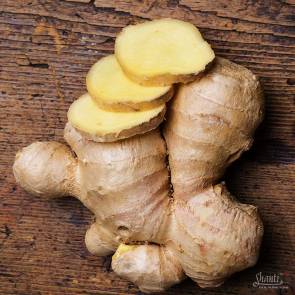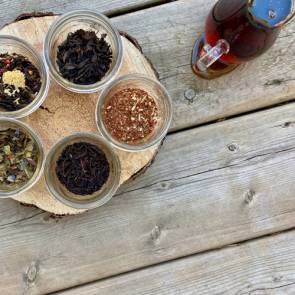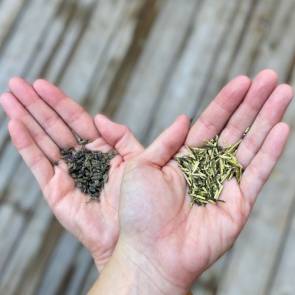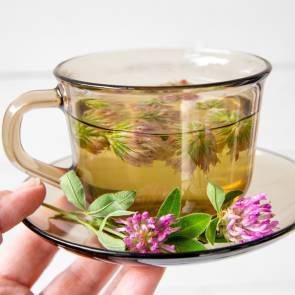
We want to know why we lack energy and how to fix it! At Shanti Tea, we believe in looking at the whole picture. Not just how to solve problems, but find out why they happen and how to fix them.
Why?
This one is pretty obvious! You need to make sure your body is getting enough sleep. The number of hours needed varies from person-to-person. Lack of sleep causes a lot more than just issues with energy! Read our solutions below for tips to get more sleep and to improve the quality of sleep.
- Diets high in carbohydrates and/or sugars are known to have a strong impact on energy levels, caused by the sharp spikes and drops in blood sugar level.
- Deficiencies in iron and protein also lead to a lack of energy.
Stress is emotionally and physically draining. Not only is it tiring to have the burden of worry, it also leads to a lack of sleep and/or poor quality of sleep. Chronic stress may lead to other negative side effects.
Another obvious point. If you are pushing your body too hard, it can also lead to exhaustion.
On the flip side, too little physical activity might also be causing your fatigue! Regular exercise boosts strength and endurance, releases endorphins and improves your mood. It can also improve the quality of your sleep. Plus, regular physical activity has many other benefits, including improved cardiovascular function, maintenance of weight (or decrease in weight), adds muscle tone, and balances hormones.
Dehydration is a loss of body fluids – mainly, water and electrolytes. The main causes are:
- Lack of water consumption
- Stress
- Exercising without replenishing water and electrolytes
- Drinking coffee, soda, fruit juice and other artificially sweetened beverages
Yes, your morning joe will give you a rush of energy, but the caffeine from coffee is also well known to cause a crash! This crash leads to reaching for another cup of coffee, repeating the cycle.
There are many health concerns, which may be having an impact on your energy levels. If you try to fix any (or all) of the above seven causes of fatigue and are still not seeing an improvement in your energy levels, you should talk to your doctor to ensure your fatigue is not the result of another health concern. Some health related factors to a loss of energy are:
- Diabetes
- Leaky gut
- Anemia
- Thyroid disease
- Adrenal fatigue
- Depression
Solutions
- Head to bed earlier. This is simple in theory, but many of us have a hard time getting to bed earlier. The number of hours you are asleep directly impact the quality of sleep and your energy levels. Try to find ways to increase the amount of time you are sleeping!
- Avoid sugary and high-carb foods before bedtime. In fact, avoid eating anything heavy in general. Spikes in sugar can keep you up, and negatively impact the quality of your sleep. Digesting a heavy meal can also impact your quality of sleep. If you feel like a late night snack, aim for lighter and cleaner snacks.
- Turn off electronics. You may have heard by now that the light emitted from your electronics has a stimulating effect. Plus, it is a distraction! Try turning off electronics 1-2 hours before you want to fall asleep to ensure a better quality sleep. Keep your phone away from your bed to avoid any temptation.
- Drink a cup of sleep tea! Chamomile (or if you don't enjoy plain chamomile, try Kamila's Chamomile Dream or Vata Balance) is a light and relaxing choice, but Shanti Tea also offers Sweet Dreams with ingredients that really help you fall asleep and maintain a deeper sleep.
- Establish habits. Take the above points and create a routine! Repeating these habits nightly, around the same time, can encourage your body to fall asleep more easily.
-
E.g.
- 8:30 pm – prepare for tomorrow. Start by preparing a list for what needs to be done the following day (this last idea is great for those of us who have a hard time sleeping because we’re planning out the to-do’s for the following day. Get together anything you may need.
- 9:00 pm - turn off electronics, do some light stretching, yoga, mediation or another peaceful activity of choice.
- 9:30 pm - drink a cup of Sweet Dreams while reading a book, writing in a journal
- 10:00 pm – bedtime activities (brush teeth, put on pj’s) if not already done.
Everyone has his or her own ideas of what the ideal diet should look like. Note that we mean your regular eating habits, not a crash diet to ‘lose weight FAST’.
- Get more nutrients from plants. Plants offer a wide variety of nutrients, including iron, protein, carbohydrates, and fats. These are all nutrients often associated with meat, but the benefit from incorporating more plant-based sources of nutrients is that it comes with so much more! Plants are leaner and high in many vitamins and minerals not found in animal-based sources. Many of us do not get enough vegetable and fruit servings in a day. This is a great way to improve your diet without having to give up on everything you love! Just add more veggies!
- Don’t skip breakfast! Eat a breakfast containing good sources of protein and carbohydrates. These will help fuel your day. Some dieticians suggest making breakfast and/or lunch your heaviest meals of the day to provide your body with the nutrients it needs for energy throughout the day.
- Eat whole foods. Try to avoid processed foods as much as possible. Many of the ingredients used in processed foods have a harmful affect on our bodies. In addition, we recommend choosing organic wherever possible. Pesticides used in agriculture have a number of alarming risks and impacts on our health in general, not just energy levels.
- Avoid energy killing sugars and bad carbs. Carbohydrates are GOOD for you, when they come from clean sources. Avoid sugars and processed carbs. Try some simple swaps! Swap your white bread for delicious whole grain (different than whole wheat, look for GRAINS), white rice for brown rice (or quinoa, millet, etc.), white potatoes for sweet potatoes, etc.. Plus, try using veggies in place of pasta! Have you ever tried zucchini noodles!?
- Healthy fats. Fats are good for you, and a great source of energy, especially before workouts. Just make sure to choose healthy, whole food sources of fats. Lean meats, avocados, nuts, chia seeds, coconut, flax seeds, dark chocolate, coconut oil, olive oil, flaxseed oil and spirulina are all great sources of healthy fats.
Stress takes a toll on your body and mind. Try some of the following solutions to help alleviate stress.
- Make sure you are getting enough sleep. Notice a pattern here? Good quality sleep has an impact on many areas of your life.
- As does exercise! Make sure to add exercise to your daily routine. Even if you can only go for a 15 minute walk. Physical activity releases feel good endorphins, which can help boost your mood and reduce stress.
- Practice mindfulness. A few minutes of focused breathing, meditation and/or physical awareness can do wonders to soothe your mind and focus on yourself. When you are feeling bouts of stress, try to calm yourself with these techniques. You may also find that these moments of focus/meditation also help you to focus on the cause of your stress, which can help to decrease stress as well.
- Connect. Whether with a friend, family member, colleague, or therapist. Face-to-face interactions can have a positive effect on your mood, plus it feels great to let it all out if you are so inclined.
- Listen to music. Dance. Laugh out loud. These are all activities which are shown to have positive affects on mood and stress.
- Drink tea. Black tea has shown to lower cortisol levels and increase relaxation. We’ve also heard time-and-time again that the ritual of tea is calming, so if you want to avoid caffeine, brew up your favourite caffeine-free cuppa and take some time to enjoy it.
There isn’t much to say here, except, stop it! There is nothing wrong with pushing yourself to do better during exercising, but pay attention to your body. It doesn’t help you if you are too sore or tired to exercise the next day. Work your way up gradually to your goals in fitness to avoid any crash from overexertion.
Physical activity is necessary. It boosts your mood, improves sleep, improves strength, maintain or improve fitness and weight, and it decreases your risk of health complications such as heart disease, high blood pressure, high cholesterol, stroke, depression and diabetes. So how do you get started?
- Start small! Studies show that the body needs 30 minutes of moderate activity per day to improve and maintain health. But if you can only manage a 10-minute walk, every other day, do that! Anything you do will have a positive impact. Plus, you will be surprised how quickly your body adapts to physical activity and improves.
- Try different types of activities. If you have sore joints, maybe swimming or water based activities are best for you to start with. Weight training to improve muscle mass, cycling or running for your cardiovascular system, or some light stretching or yoga to improve flexibility.
- You don’t have to do it all at once! If you find that 30 minutes is overwhelming, make a few simple swaps. Take the stairs instead of elevator, take a walk at lunch, get up every few minutes if you have a desk job for a quick stretch, or anything else you can think of to easily incorporate into your day.
- Do something you enjoy. If you love it, you will do it!
- It is said that if you feel thirsty, you are already dehydrated. Make sure to pay attention to how much water you take in!
- Try this rule of thumb. Take your weight, divide that in half. That is how many ounces you should drink per day (e.g. 130lb person, divided by 2 = 65. A 130lb person should drink approximately 65oz of water per day (1.92 L).
- Drink water throughout the day, not just all at once when you feel thirst.
- If you feel hungry, try drinking water. Often people experience feelings of hunger when in fact they are lacking water.
- Consume electrolytes. Electrolytes are found in sodium, potassium, calcium and magnesium. Eating foods rich in these minerals are good for you in so many ways! Coconut water, bananas, dark leafy greens, nuts and seeds, and cucumbers to name a few.
You can keep drinking coffee if you wish, but try to cut back! Start swapping tea (which is a good source of fluids despite it's caffeine content) wherever possible. Try our Irish Breakfast blend for a strong cup.
-
Try these for energy:
- Spirit* - our new wellness blend for a big boost to energy levels, featuring guayusa, yerba mate, eleutherococcus, gingko, carob root and roasted chicory root.
- Green tea*
- Yerba Mate*
- Guayusa*
- Ashwagandha
- Eleutherococcus Ginseng Root
- Tulsi
- Maca (add to smoothies, oatmeal, and more!)
- *contains caffeine
- Headache relief. One of the most common symptoms of caffeine withdrawal is a headache. There are over-the-counter medications, but we like to try and remedy headaches naturally. Ginger, peppermint, lavender, cloves, catnip, passionflower are all great to infuse into a headache busting tea. A little peppermint oil on the temple is also a great remedy.
- Eat more healthy foods. Food (as we mentioned already) impacts your energy levels. Adding more healthy options to your day can give you more energy, reducing your need for a caffeine fix.
We do not want to encourage self-diagnosis! If you try the solutions listed above and still experience fatigue, please talk to your doctor.









